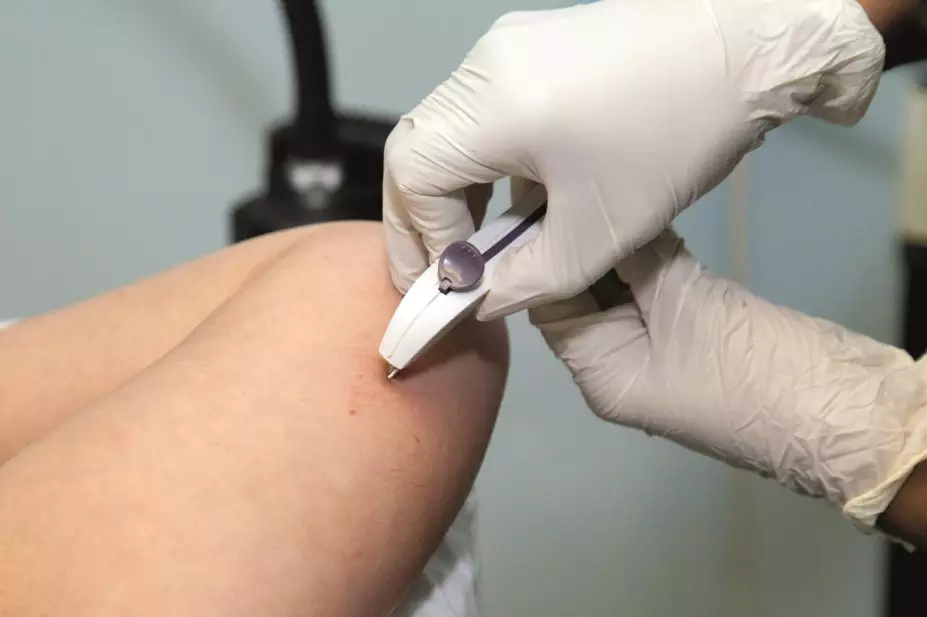
Imagedoc / Alamy Stock Photo
Women who use a contraceptive implant are more likely to have a repeat abortion than those using certain other birth control methods, a UK study suggests.
Data from 13,621 women in the Grampian region in Scotland show that 23.4% who had a first termination underwent a repeat termination. The retrospective study found those who used a progestogen implant were more likely to have a second abortion than those using no or unknown contraception methods. Evidence suggested many women fail to renew their implant, which is typically required after three years.
At the time of initial conception, there was no link between the type of contraceptive method being used and the risk of a repeat abortion. However, women fitted with a contraceptive implant after an initial termination were 78% more likely to have a repeat termination compared to those using no, unknown or natural methods of contraception.
The study also shows women who used implants or depot medroxyprogesterone acetate (DMPA) injections were more likely to have the second abortion between two and five years after their first termination, rather than within the first two years.
The chance of a repeat termination was 5.59 times higher in women aged under 20 years at the time of initial termination; 1.51 times in women with two previous live births; and 1.23 times among those in the most deprived social quintile compared with the least deprived.
According to the researchers from the University of Aberdeen and NHS Grampian, although long-acting reversible contraception (LARC) methods such as implants and injections are effective, discontinuation rates are high over the longer term. Contributing factors may include missed GP appointments and side effects such as irregular bleeding. Possible over-promotion of LARC methods could also play a role because their use “may not reflect the women’s own contraceptive choice”, researchers said, and urged a “woman-centred” approach to post-termination contraceptive counselling.
Writing in the Journal of Family Planning and Reproductive Health Care
[1]
(online, 7 December 2015), study authors say a targeted recall system to follow up women prescribed LARCs may help reduce discontinuation rates. “Downloadable mobile phone applications may play an important role in the future in reminding women that their contraceptive implant is due for renewal,” they explain.
The UK’s National Institute for Health and Care Excellence (NICE) recommends women are given information about and offered a choice of all contraceptive methods, pointing out that LARCs are more cost effective for the NHS than the combined oral contraceptive pill.
Natika Halil, chief executive of the Family Planning Association, says: “It’s really important that women have the opportunity following an abortion… to have a conversation about the full range of contraceptive methods available so they understand what their options are.
“We can’t just assume ‘job done’ when a woman starts to use LARC methods,” she adds. “We need to think about what is in place down the line so women are informed about their ongoing options and can easily access services for support and to either renew or change a method to best suit their lifestyle. We know that in some areas women are not offered the full range.”
A spokesperson for Pfizer, which manufactures DMPA injection Depo-Provera, says: “The safety and efficacy of DMPA… have been well established through numerous clinical studies around the world. The product has been available as an important contraception option to women for more than 40 years.
“It is important that women have access to contraceptive options that can help improve their family planning choices. Use of contraception is a personal choice and DMPA is an important treatment option for many women.”
A spokesperson for pharmaceutical company MSD, which makes Nexplanon (etonogestrel), the contraceptive implant most commonly used by the NHS, says: “Nexplanon’s safety profile and efficacy have been established in clinical trials… the choice and suitability of a contraceptive method for any individual should always be discussed with an appropriate healthcare professional.”
References
[1] McCall SJ, Flett G, Okpo E et al. Who has a repeat abortion? Identifying women at risk of repeated terminations of pregnancy: analysis of routinely collected health care data. J Fam Plann Reprod Health Care 2015. doi:10.1136/jfprhc-2014-101059
You may also be interested in

Provision of progestogen-only pill with emergency contraception in community pharmacy improves ongoing contraception use

Government group recommends reclassifying progestogen-only pill as an OTC medicine
